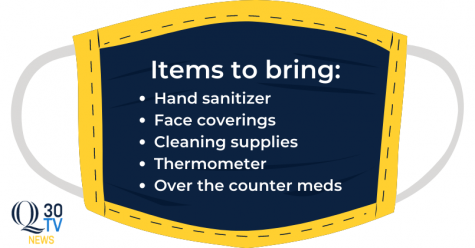A new look for the 2020-21 fall semester
When students and faculty return to the Quinnipiac campuses this fall semester it will look very different. There is signage around all three campuses reminding those coming on to campus to wear a face covering, social distance and to practice good hygiene.
“We will put in guidelines and we’ll put in some physical reminders in terms of how to space yourself in the dining areas or a classroom,” Director of the global public health program Dr. David Hill said. “But, we have to rely on individuals to inhere to those measures.”
Students should come to campus with face-coverings at all times, not just to protect yourself but others around you. If you do not have one for the day, one may be provided to you.
“Hopefully there will be face coverings available,” Hill said. ”For instance, they may be available in classrooms or common entry spaces so that you can pick one up. Someone may ask you to go back to your room or go back to your car and get your face covering… I don’t think you should be on campus without a face covering.”
Quinnipiac will be providing all employees and students with two Quinnipiac face masks, which were shown on Irsa Awan in the “Navigate Quinnipiac” youtube video.
Popular areas on the Mount Carmel campus will be reduced to the number of people that can be in those spaces. The cafeteria, student center and the library are among the few things that won’t be as occupied this year.
Class sizes will also look different to comply with social distancing. Professors are in the process of drafting up a structure on how their classes in the fall will look like.
Some classes have gone completely online this fall with no in-person classes to be taught.
“All of my classes for the fall will be online,” professor Aileen Dever said. Dever will be teaching advanced Spanish this fall and is in the process of working on a number of practice worksheets for her students.
According to Hill, each school/faculty member is looking at their classes now and deciding how to structure them.
“All options are being considered,” Hill said. “Also, dividing the class in half and having one half come in person and the other online and then switching for the next class. What is clear is that every classroom will be zoom compatible so that you will have full access to what is going on in the classroom whether you are there in person or joining from your room or home.”
Depending on how professors decide to teach their classes this fall, sophomore psychology major Kairyn Jimenez feels it can limit the amount of curriculum covered.
“As of right now, based on my Freshman year college experience, it is crucial that we stay on top of the timeline in order to complete assignments and tests on a timely manner,” Jimenez said. “Once the teacher falls behind, they may cut a lecture short or remind us to go over the rest at home. I wonder how great of an impact this half and half teaching is going to take on a professor’s syllabus.”
Another thing to consider is what happens when a student is sick with COVID-19 symptoms.
If students feel sick they are urged to not leave their dorms or off-campus housing. Dever says she will work with her students should something come up, but it all depends on how long they have to be out for.
The university is currently negotiating with a developer called MyOwnMed to have the entire Quinnipiac Community download an app for their phones.
“This will be a symptom tracking app and when you login in the morning it will come up, the very symptoms will ask you if you have those,” Hill said. “So if anybody really has any respiratory symptoms we’d ask that they not put themselves in the midst of the Quinnipiac community. That they stay in their rooms or stay at home if they live off-campus, that would apply to faculty and staff and graduate students.”
It’s encouraged that if you have any of the symptoms you then contact the health center or your own health care physician.
Students should bring a thermometer with them to campus in case they need to test themselves for a fever which could be related to COVID-19.

It’s also recommended that students bring over-the-counter medicine, their own supply of hand sanitizer and cleaning supplies.
Should someone within the Quinnipiac community test positive for COVID-19, contact tracing will be done to make sure everyone that person was in contact with gets checked out.
Quinnipiac Valley Health District is the university’s local health district that will help manage cases and contracts. The university also has a script from the state of Connecticut that the contact tracers will use. Contact tracers at Quinnipiac will be five medical students.
Specific guidelines for students using the bathrooms in residence halls are, minimizing the time spent, no cell phone use in the bathroom, not storing personal items, they have to wipe down surfaces after using it, and of course, remembering to wash their hands.
Jimenez doesn’t think first-year students will follow the specific guidelines for the residence halls due to the excitement of their first year away at college.
“The excitement of living on campus one’s Freshman year is immense. That’s usually the part most students look forward to,” Jimenez said. “Truly, unless guidelines are strictly implemented I doubt that incoming students will follow guidelines.”
The hope is that students comply with the guidelines in place to not only keep themselves safe but others safe as well. Students should monitor the Quinnipiac website for any new changes for this upcoming year.



